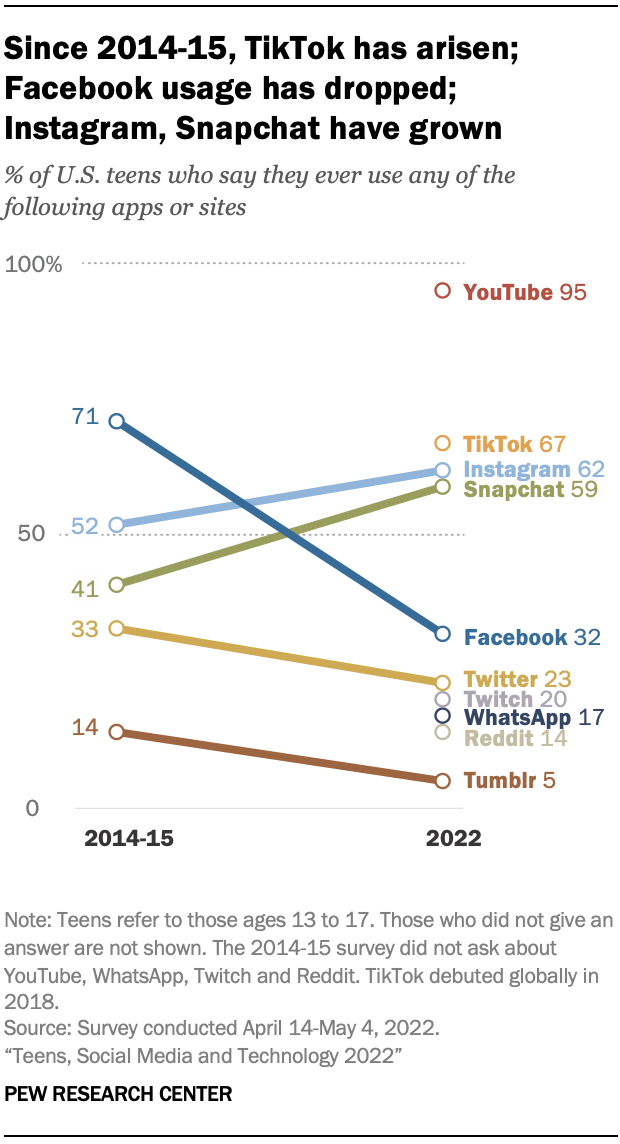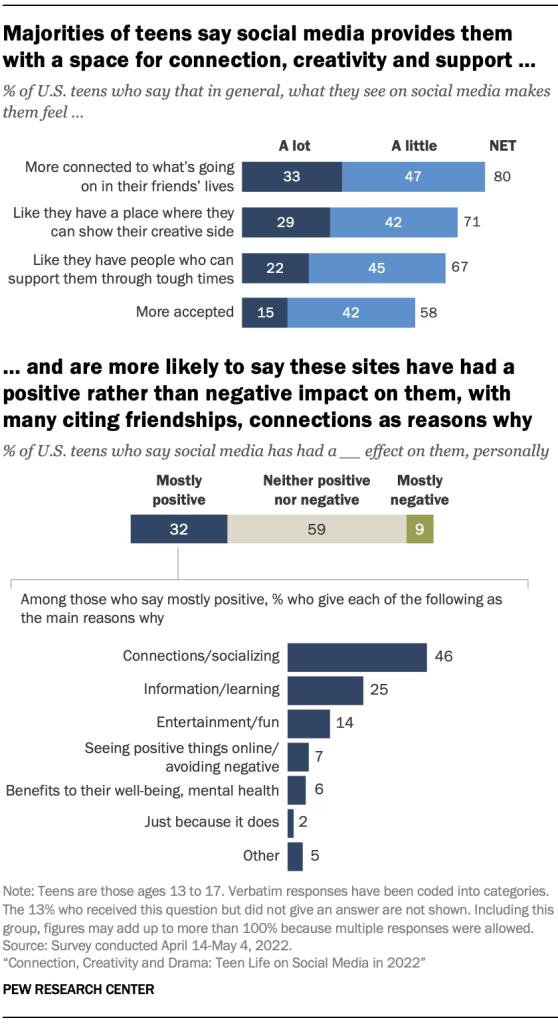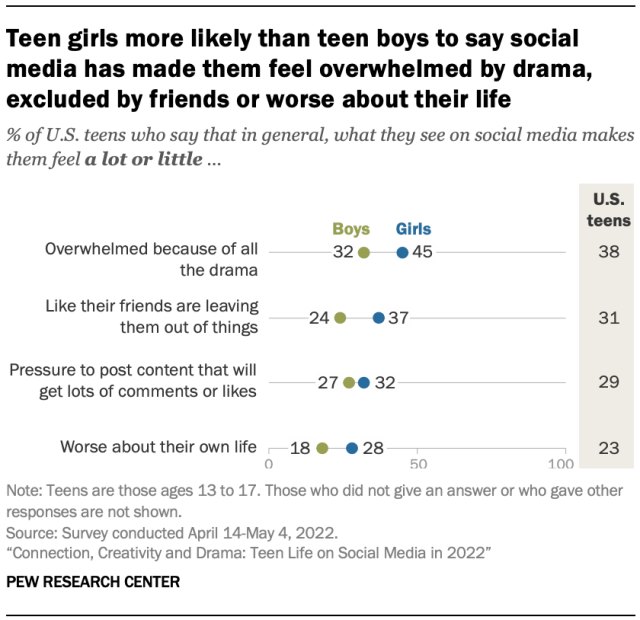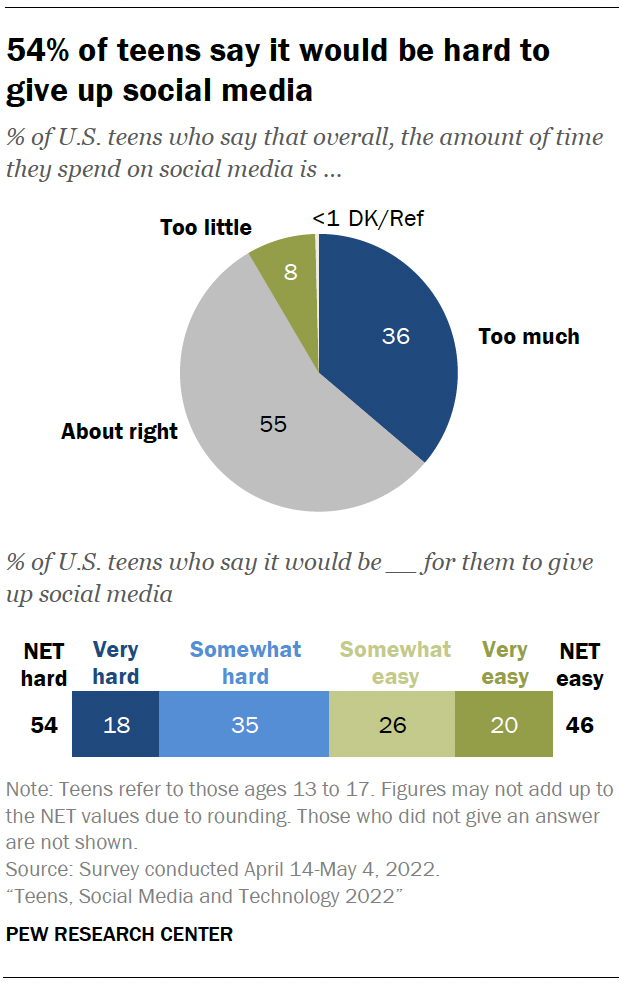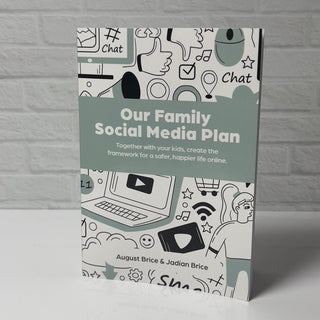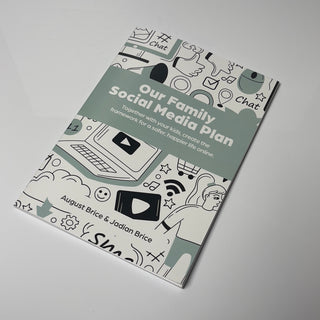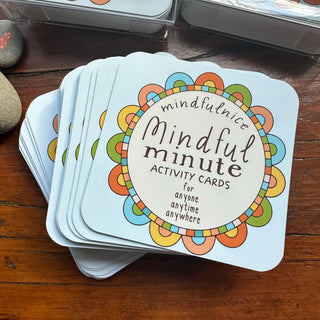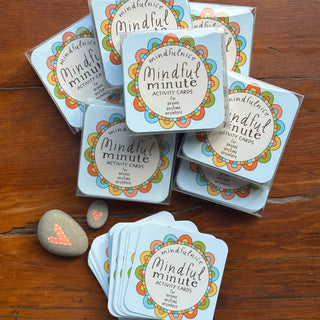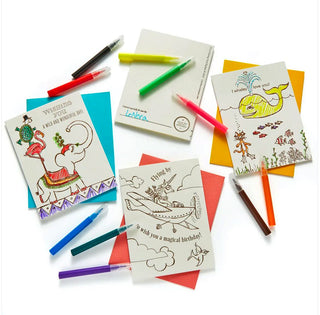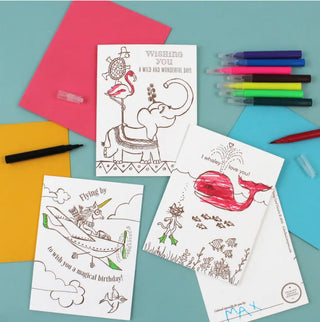Every parent gets it. Getting a Social Media Account is a rite of passage for their child.
Parents are asking ‘Is social media safe for my kids?’ Based on our review of the data, there isn’t enough evidence that it is safe for our kids.”
US Surgeon General Advisory, May, 2023

The Surgeon General warns of a Profound Risk Of Harm for kids. Not just from Social Media, but from Screen Time in General.
Using a Smartphone, staring at the screen, going on social media-- it's all just part of growing up today.
And just like it's Mom and Dad's job to keep them safe and confident as they learn to cross the street, do their homework, play their sport, refine a creative talent or drive a car, parents are now tasked with the job of helping them be successful on Social Media.
I've put together a comprehensive Tech Wellness Family Social Media Success Plan that you can collaborate on with your kids to create a more healthy and joyful relationship with social media.
Here's what we'll cover here first:
Click any of the links to go directly to that section--
- What Research Says About Kids And Social Media
- Social Media Pros and Cons
- The Potential Risks Of Social Media
- Social Media -Big Lawsuits and New Laws
- Risks Of Social Media
- It's A Business First
- Triggers and Rewards
- Malgorithm
- FOMO, Depression, Anxiety
- Connection
- Social Comparison
- Building Their Brand And Winning AT Social Media
- Your Family Social Media Success Plan
- Social Media Glossary
The latest from the Surgeon General, Pew Research and the Boston Children's Digital Lab is in and it aligns with other studies showing that over 94% of teens have access to a smartphone or a device.
AMAZING! 95% of Kids 13-17 report that having their own phone, are on social media and most check in until 10:00pm.
Over 53% say they are Somewhat to Completely Addicted! OUR KIDS ARE CRYING OUT FOR HELP!

Almost a third of kids said being on social Media was the cause of lower grades in school and almost half said it caused them to have negative body image.
Here's the Social Media Of Choice For Teens Today-Topping the List, YouTube:
YouTube is used by 95% of teens. Over 65% are using TikTok followed by Instagram and SnapChat.
The chart below compares which social media channels teens used most, to what they were on almost a decade ago:
Teens don't just have social media accounts, they visit them just about everyday- and just about 20% said they use them constantly!
But of course, Social Media can be pretty great actually.
The Harvard and Boston Children's Hospital surveyed kids and found that almost half of them had positive things to say about how Social Media made their lives better because it made their friend relationships better: Closer and more opportunities to communicate.
Almost 80% said they felt socially connected, and 69% said that felt emotional support from their peers and close to half said being on Social accounts didn't make them feel sad or depressed or less than.
The Social Media Pro-Con List:
PRO'S: Social Media Can Help Your child:
- Stay connected to extended family and friends
- Connect to school activities, teachers, and classes.
- Foster healthy friendships at school and online-It’s called Bonding Social Capital and Social Support. You can read more about it below
- Stay up on current trends and important cultural events
- Enhance their creativity by sharing ideas about music, hobbies, sports and art.
- Express and develop their talents by producing artful, interesting content
- Share their feelings and thoughts about their passions, ideas and what’s important to them.
- Create and Develop their unique Brand
CON'S: Social Media Can Cause Distress for your child:
- FOMO Fear of Missing Out is real. So is seeing that you have been left out of a fun event your friends had;
- They can have a false sense of security- thinking they really are connected to a friend when really, the relationship superficial;
- Social Comparison. It's nothing new- but it manifests differently online and can cause depression and anxiety. Read more about it below;
- Can expose them to real scary online dangers for kids like cyber bullying, adult content and porn, and online predators and ads;
- Can Harm Their Brand. What your kids post could harm their reputations. What’s posted online lives on permanently somewhere, even if it’s deleted. Kids choices are not adult choices and they may be unfairly judged by a picture they post or something they say.
- A safety risk. Your child’s location and activity may be tracked. Links to ads on social media can ask for private details.
- It can lower their self esteem in many ways:
-
- Selfies and Body image: A study showed that simply by taking and posting a selfie, girls reported less confidence and lower self esteem
- Lowered self esteem by posting something on social media and someone does not like their post, they may be engulfed in guilt. They may be worried that they said something wrong, they may spend hours fretting over one single post.
- Lowered self esteem because they may have a "post persona" where they mimic or pretend to be someone they're not- like an influencer perhaps;
- Finally, they may just become obsessed with social media. Even addicted. I share some great research on this below.

41 United States Attorney General Are Suing Meta!
A hefty lawsuit asking for changes and what could be very hefty fines to Meta, Instagram and Facebook was filed in California on October 24, 2023.
WHAT THE META LAWSUIT SAYS WHAT FACEBOOK AND INSTAGRAM DO TO KIDS:
META Uses Kids To Make Money
- Meta monetize young users' attention through data harvesting and targeted ads
- Specifically targets young kids
-
Designs Instagram and Facebook so kids spend more time on the platforms
META Is Not truthful when it claims it's Safe and Not Addictive
- Meta represents that it's Social Media Platforms are designed to support young users' well being.
- Meta puts getting kids to go on Instagram and Facebook over safety
- Meta uses Algorithms to encourage compulsive use but doesn't tell kids
- Those Algorithms are harmful to kids mental health, even though Meta say's they are not
- Meta causes kids to compare themselves and use the Instagram and Facebook to compulsively via "Likes"
- By using disruptive pictures/video/sound and exciting notifications, kids are enticed to use and their sleep and school are interrupted.
- Instagram and Facebook use filters that are known to make kids feel bad about their bodies and have eating disorders
- Meta says they promote connection with friends, when actually they are promoting time on Instagram and Facebook
- Instagram and Facebook platforms make it easy for younger and more vulnerable kids to use, and they make it easy for kids to become addicted to these Apps and Meta misrepresents these flaws.
- Meta collects data without parent consent even though they know their Apps are directed to kids.
Hundreds of pages detail the many ways that Meta harms kids while knowing it. They include research that links their Social Media Platforms to depression, anxiety, insomnia and interference with life and education. They show Instagram ads that are targeted to kids and explain that Instagram wants to monetize them and keep them as a customer for life.
Then each State presents specific laws Meta has violated from Fraud to Coercion. Then proposes fines. Indeed this is Big Lawsuit.
Reuters wrote that Meta said it was "disappointed"
This Meta Lawsuit and those new Social Media laws may not change things for awhile but they are definitely getting our attention!
Think of them as a HUGE flashing yellow light. The laws tell us loud and clear that something has to be done to keep kids from all the pitfalls involved in using social media.
States have recently passed landmark Laws about social media safety for kids
Your child's journey through Social Media can be productive or perilous.
That's why the Surgeon General has called for Tech Companies, Researchers and Lawmakers to do more. Here's a copy of the May 2023 Report Summary.
Florida banned Social Media for kids under 14 years old!
Florida join’s other states like Cali and Arkansas and passes a law saying kids under 14 can’t sign up for a social media account. And when they do turn 14 or 15 they will need to have their parents permission in order to go on any social media platform. The law overwhelmingly passed both legislative chambers with ease- with Democrats joining Republicans.
Montana banned Tik Tok
Meanwhile, both conservative and liberal states passed landmark laws to make it safer and less addicting. I've read them both. And I'm betting many parents will find them a welcome relief.
Utah passed Social Media Safety and Privacy laws for kids under 18:
- Parents will have to give the written permission for their kids to have an account
- No social media from 10:30 pm to 6:30 am without parent's permission
- Parents will be able to see all activity on their kid'
s accounts - No ads can be shown on social media feeds
- Apps won't be allowed to show any content or have a design that is known to be addictive
- No direct messaging that isn't to "friends"
- Apps will have to dispose of any personal information they have on kids.
California passed a Children's Online Safety and Privacy law too. By default, after July 1st, when a kid uses any online product or service, this would happen:
- the highest privacy options would be enabled by default
- Location, Siri, Public Account, Camera and Photos all would be OFF
- A Notice will pop up, written for kids, explaining policies and standards
- No personal information will be collected, no selling, no geo-location
META's Facebook and Instagram, YouTube, SnapChat, Discord, Tumblr, Twitter- Reddit, in fact, any app or website will be held to these rules.
And as you might expect, lawsuits have has already been filed to try and stop these new laws or bans from going into effect.
And you be won't be surprised whose behind the lawsuit: NetChoice is the industry group that includes members like Amazon, Google, Meta, and TikTok.
Hundreds of pages detail the many ways that Meta harms kids while knowing it. They include research that links their Social Media Platforms to depression, anxiety, insomnia and interference with life and education. They show Instagram ads that are targeted to kids and explain that Instagram wants to monetize them and keep them as a customer for life.
Then each State presents specific laws Meta has violated from Fraud to Coercion. Then proposes fines. Indeed this is Big Lawsuit.
Reuters wrote that Meta said it was "disappointed"
This Meta Lawsuit and those new Social Media laws may not change things for awhile but they are definitely getting our attention!
Think of them as a HUGE flashing yellow light. The laws tell us loud and clear that something has to be done to keep kids from all the pitfalls involved in using social media.
Until Safer, Less Addictive Social Media Becomes Required, The Best Protection I've Found Is A Social Media Success Plan For Your Children
Social Media companies' one goal is to make money off of their users: including your children
It's good to remember that each social media platform- from YouTube to TikTok is a For Profit Corporation. They are in business not so much to help us connect or stay current on the latest fashion and trends, but to make money.
Because profit means more time on site, the sites show them things that may be unrealistic, even posts that are contrived- just to get attention. And keep those young eyeballs glued to their phones.
It seems so real and so innocent at first—Oh wow, Lela had the best birthday party and all her other middle school friends are on TikTok- she wants to post that video of all the girls holding hands and jumping in the water at the same time— ahhhhh so cute. So Fun.
Mom helps her open the account, Dad helps her make the boomerang and so it goes. You all gather round as the likes and comments come in. Lela! “Your party! That cake! Love you!”
And so it begins. All the joy and excitement, from real friends no less- this is what social media was meant to be.

But for TikTok, Snap Chat, Instagram and the others- this isn’t about Lela’s party or her friends, it’s about the potential for all of them to become customers who like and buy via their platforms.. It’s about getting Lela’s attention and figuring out what she likes and what she wants to see more of, so they can hook her into being on their app more. And Longer. The more time she spends looking at her feed, the more ads she’ll see and the more money Tik Tok, SnapChat, Intstagram or Discord will make.
This is where Parenting comes in strong.
Know that your kids will be sucked in. It’s called the Hook Model and Nir Eyal coined the term that consists of triggers and intermittent reinforcement to get your kids- and your kids mom and dad into a behavior habit. The habit of checking the feed.
Triggers: Things like Notifications or Likes or friends posts, cause us to engage.
Intermittent Reinforcement is how as users we get rewards- like emoji's or ads with music at random intervals.
The Social Media Triggers and Rewards Feel Good And That Means Dopamine
The problem with dopamine is that it feels so good, you want more and that can lead eventually to addiction.
Let them know how, if their old enough to understand, how this works. It's helpful to be aware that the people who design the apps realize that their brains can start requiring more and more stimulation to produce the "dopamine hit" and that means they’ll want to go on their accounts more and more. Let them know that More and More isn’t necessarily the right thing to do.
That's why it's important to be mindful of how much time and attention the social feeds are taking and help them take control of how much and how long and how often they go on their social channels
Life in Balance is Key. Time outside, in books, in school, in play, all balanced with time on social media. A Social Media Success Plan can help with this concept.
Social Platforms Are Built To Keep Attention, Not To Accurately Inform
This is really important to tell your teen and older. With everything going on in the world, Social Media can start to feel like a news source. Let them know that Twitter, Facebook, Instagram, and others compete for their attention and then try and keep them from jumping off their platforms on to another. They don’t care what they see, as long as your kids keep looking.
The information is not vetted to be exact, true, correct, appropriate or not- Nice stuff or mean stuff- it’s all the same as long as you child keeps coming back and scrolling.
Twitter, Google, Facebook, Instagram, LinkedIn and Others Are Not "News" Channels
Algorithms determine what your kid likes best on Social Media

They really need to know this— or at least you do to guide them. The algorithms these social platforms use can think they know what your kid wants based on what they’ve looked at and then they keep showing more and more and more of that kind of thing or point of view, until your child might believe that what's on their feed is the undeniable truth.
Sometimes it is. But sometimes it absolutely isn’t.
When an algorithm is harmful, distressing, unfair or manipulative- it can be downright malicious, I like to call those algorithms "malgorithms."
Malgoithms can lead to What's Called A Filter Bubble
Although some claim it doesn't exist, Wikipedia defines filter bubble this way: "A state of intellectual isolation that allegedly can result because an algorithm selectively guesses what information users would like to see based on user searches, location, and click behavior. As a result, users become separated from information that disagrees with their viewpoints.
" Did you know that your teen could watch days of videos from people who claim the world is flat? But just because they can watch it, doesn’t make it true.
Teach your children discernment.
Social Media Feeds Can Cause Distress For Your Child
Fear Of Missing Out
Two recent research projects found that when young people- just starting college limited use of Facebook, Instagram and Snapchat to just ten minutes a day, they felt significantly less depressed and lonely. Another study found that if kids could just keep their Social Media time under 30 minutes a day, they would have less anxiety and FOMO!
FOMO IS REAL AND IT CAN HURT
Back in 2003 Harvard Student Patrick McGinnis coined the term FOMO, in a paper that questioned why 50% of Evites on campus went unopened. He says FOMO can be described as “Unwanted anxiety provoked by the perception, often aggravated via social media, that others are having experiences that are more satisfying than yours “
"Fear Of Missing Out" has gone bananas in the digital age.
FOMO and it’s fears, worries, and anxieties that happen when it looks like someone is doing something that looks better than what you’re doing or doing something without you, and even worse, with your friends! Ouch. Sure, FOMO can happen anytime and anywhere, but feelings of FOMO can be magnified during a social media visit.
I’ve been there. I bet you have too and no one needs to tell us that this is not a happy place. It’s bad enough finding out you weren’t invited to the party, so imagine what it’s like for your child to see dozens of things everyday his fellow classmates or friends are doing that he’s not just by scrolling through his phone.
FOMO can be real as in you really did miss out or perceived as in, I “feel like” I’m missing out.
Either way FOMO is linked to loneliness. Research on young adults showed online FOMO brought down their confidence in the ability to participate in the kind of social interaction that’s needed for healthy interpersonal relationships. Higher FOMO was also linked to a satisfaction with their life.
How concerned Should You Be If Your Child Tends To Have High FOMO marks?
On study found kids who had more FOMO used more Facebook:
A study of over 400 kids found out that not surprisingly, that kids who had a stronger need to belong or desire to be popular had more FOMO. They also found these kids used Facebook more intensely and here’s something to note, they had more stress when they thought they weren’t popular on Facebook.
This study demonstrates that everyday variety of FOMO can get even stronger when it takes place in the one dimensional online world
Social Media allows us to post our highlight reel, not the minute to minute mundane. This unreality can cause kids to feel they’re being left out or missing out on fun. The study above showed kids who had less Social Media time also experienced decreases in FOMO.
BUT, if used mindfully, be encouraged that research shows that Social Media is also a great place to connect. A full one third of teens told Pew Research that they felt very connected to their friends through Social Media. Almost a quarter said they have people there that can support them through tough times!
Parents, this can happen for your child too. Participate with them in their social media when their young. Model positive interactions for them. Congratulate friends, support others online and then show your kids what you're doing and show them how to do the same.
Being aware of concepts like Social Comparison can help make what's happening as they scroll social media more clear.
Social Comparison on Social Media
This is a concept as old as time- but it plays out differently on line, where we don't always see the whole picture of who were comparing ourselves to.
Upward and Downward Social Comparison:
A fifteen minute scroll through social media can introduce your son or daughter to kids who have things your kids didn’t even know they wanted. Kids who have done things they think they will never be able to do, which can cause depression or maybe they'll dream about doing those things someday. Sometimes the Upward Social Comparison can be enlightening and motivating. That’s an example of the dopamine hit we talked about earlier, the “charge” that feels good and motivates us to take action.
The Downward Social Comparisons of kids who don’t have it as good can happen to. They just don’t happen as often on social media unless your child is specifically following accounts that feature people or kids that with food insecurity or housing insecurities. Downward Social Comparison can serve to make kids feel grateful. That’s the good side of comparison.
The crazy thing is that our kids could be comparing themselves to other kids and other people who honestly, might not even be showing a true representation of themselves.
Your Guidance Through Social Media Is Even More Important If You Have A Daughter
Over 50% more girls than boys said that Social Media made them feel worse about their own lives.
This makes me so very sad. Feeling their life isn't as good as someone else's is a very hard feeling for a parent to witness.
And one more reason parents really need to get involved--the hurt can be staved off to some degree just by letting kids know that what they see on Social Media isn't exactly REAL.
It can be planned, contrived to only show the best. Not to mention the filters and production elements.
Since we know kids can easily fall into Social Comparison- which means comparing themselves to others--and that comparison can cause that less-then feeling, which can lead to self esteem issues, which can then lead to depression- it's best to cut it off at the pass.
Talk to your kids about the reality of "what you see is not necessarily what you would get"-
Also, help them be mindful of what THEY put on Social Media. For the sake of their own personal reputation or Brand. And remind them that like almost everything online, their information, even if they are under 13 or under 18 is NOT private.
Building A Social Media Brand
Like it or not, we’re all building our “brand” online.
Having a bit of marketing background as I was once the co-owner of one of California’s top advertising agencies, I know a lot about brands. Brands usually refer to companies or products and the brand helps people identify a particular company or product.
But over the years it’s become clear that people have brands. A brand is what helps people shape their perceptions of you.
Be mindful to share with your kids: every post matters.
A brand is built one message at at time.
What's the Right Age For A Social Media Account?

It's the same for every social media platform: 13.
The US Law mandates that kids under 13 are not allowed to have their own Social Media accounts. Even so, kids- many with their parents blessings, lie about their age so they can have an account. And that's interesting in light of the announcement by the Surgeon General, that he believes 13 is too young.
And remember even if a child’s Instagram or Snapchat- or any online account is deleted, everything said and shared to that point can be saved by Facebook and by others— and if someone else online keeps it or takes a screenshot to post later, a picture they took or words they shared can follow them forever.
Here's one more reason why it's important to guide your child on their Social Media journey. Over half of the teens that use it say they would have a hard time not using it.
Social Media and Kids: The more they know, the more you're involved, the better off they will be.
Fortunately, many schools have introduced Digital Citizenship programs which offer education about social media to help inform your kids. But don't abdicate that job to your school to take on by themselves. Your kids need you.
I've created a Family Social Media Success Plan for you and your family to get on the same page when it comes to what you think is the healthiest and safest way for your kids to enjoy Social Media.
It also includes links to my favorite Kids Online educational programs if you want more support or if your school doesn't help with that aspect of education.
Tech Wellness Family Social Media Success Plan let's you collaborate on with your kids to create a more healthy and joyful relationship with social media. Sign up here to get early access!
I know it's tougher than ever to parent these days. You're doing a great job Mom and Dad and I salute you.
Be Well!
August


